12 Shopify Apps for Increasing Traffic and Marketing
Due to popular demand–thank you!–we wanted to share a further look at the top apps for building a retail store on Shopify. Our last article reviewed 14 Shopify Apps to Boost Sales and Streamline Operations. Now here’s our part two: Shopify apps for marketing and driving traffic to your online store.
The preface remains the same. This article is about brainstorming the optimal plan forward for your online business. Not every app is for every store. Yet, in reading about them, we hope to encourage merchants to explore new solutions and features for common challenges.
One of Shopify’s biggest draws is its ecosystem of app developers who build for the evolution of online retail. Here we present apps for three stages of marketing in the online sales cycle: getting traffic to your site, converting onsite shoppers to buyers, and engaging them after they leave.
Related: Takeaways from Shopify Unite 2017
Apps for Increasing Traffic to Your Store
SEO Manager: $20/month

Ecommerce retailers’ first step with SEO Manager is to run its SEO Check Up Scan. Using 17 different SEO criteria, the app diagnoses every product page in an online store and gives each criteria a “true or false” rating. From its findings, retailers are then prompted to fix any absent or broken SEO aspects on a page. The goal is to get all 17 SEO categories to read true, resulting in strong, consistent meta data across the site–and better ranking in shopper search queries.
Clever Adwords: Free
This app links with a merchant’s Google Ad Words account to optimize the display and ranking of its ads. Once Clever Adwords is installed, the app scans the online store for the best keywords to describe it. The store owner then has the opportunity to fine tune the keywords, as well as select imagery for the ads. When the keywords and photos are finalized, Clever Adwords creates the ads for display. Retailers then imput their daily budget, and publish the ad. They can go forward knowing their Google ads are optimized for keywords and imagery–and that the ads will stay within their budget.
Yotpo: Free core product to paid subscriptions
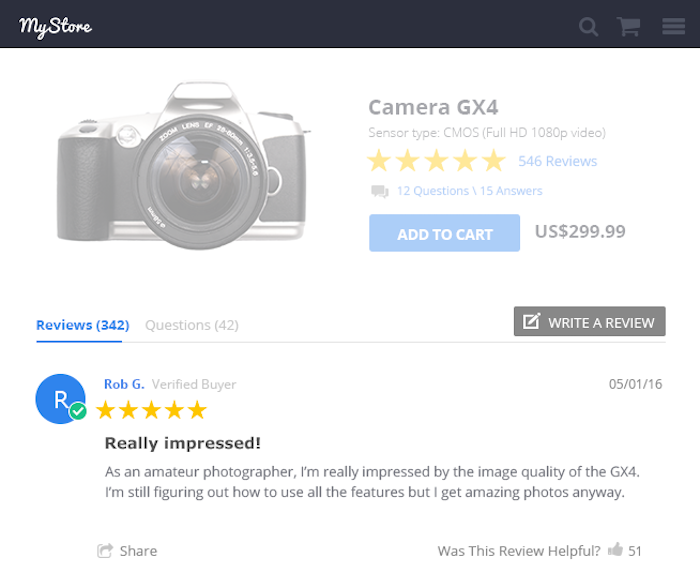
Yotpo prompts customers to review recent purchases and then captures this content–in the form of reviews, photos, and Q &A–for display on a retailer’s site. The app also pushes the top customer reviews to Google and other search engines. Additionally, retailers can hand select which reviews to highlight on Facebook, Yelp, etc. After seeing a high volume of positive reviews, new shoppers are enticed to check out new retailers. With Yotpo’s 800+ 5-star reviews in the Shopify App Store, online merchants praise this app for big returns with little fuss.
Apps for Converting Sales with Onsite Shoppers
Facebook Chat by Beeketing: Free
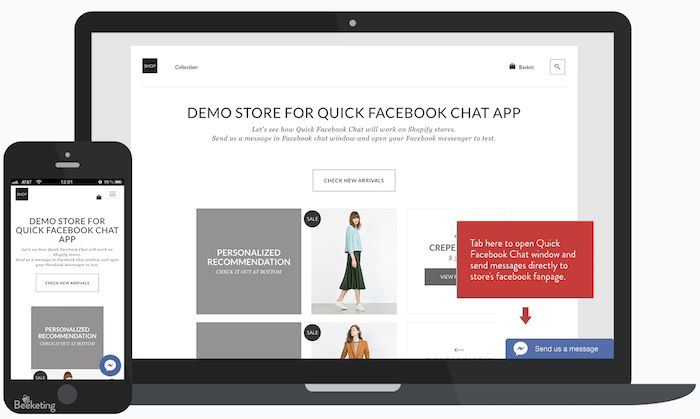
Earlier this year, TechCrunch reported that Facebook Messenger now has roughly 1.2 billion active users. And, while Facebook feeds are falling out of favor among teens, they still use Messenger. The chat feature has staying power. With this in mind, Beeketing offers the availability to host a Facebook chat right from an online store. Shoppers don’t have to sign up for an account; they use their Facebook profile to connect and begin a conversation. As a result, customers share basic profile information with merchants. For instance, retailers may learn a shopper’s birthdate and offer a custom discount as a gift. As merchants gain a better understanding of their customers, they can tailor their store to their audience and increase sales. They’re also able to answer questions and give support quickly via Facebook Messenger, resulting in greater sales.
Pre-Order Manager: Free – $24.95/month
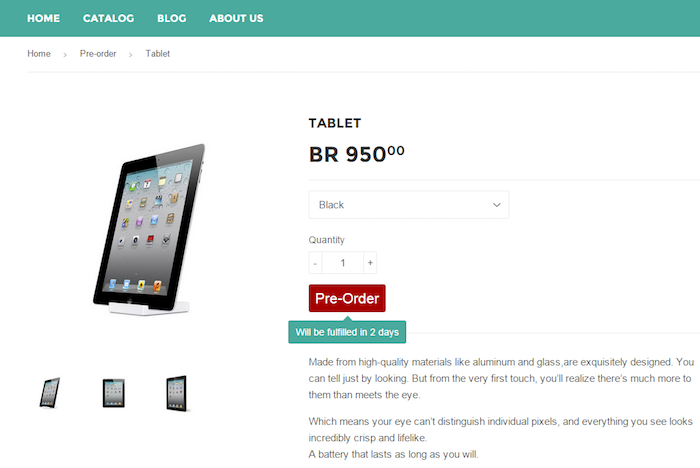
Let’s say you’re an authorized merchant for the iPhone 8. Or perhaps a bookseller for a beloved author soon to release her next novel. These items are not yet available, but as people start searching for the products, you want to capture the sale. The Pre-Order manager allows retailers to do this. It can add a pre-order button to any product. Retailers can also customize the button in terms of color, message, and more. Hopefully retailers never run out of a popular item, but in case this happens, this app also helps retain shoppers who want an out of stock item by letting them buy it as a pre-order.
Covet.pics – Lookbook and Instagram Galleries: Free
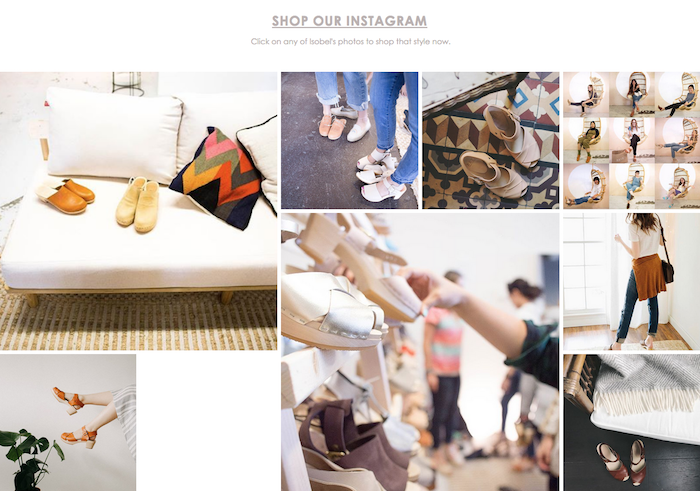
For retailers with large Instagram followings, Covet.pics brings fan photos right into the online store. To begin, merchants select the users and hashtags they want to feed into their onsite Instagram gallery. Then they determine the gallery layout–strip vs. collage, for example–and the Instagram photos begin to stream into the gallery. Take a look at Bryr Clogs; they have over 41,000 Instagram followers. They installed Covet.pics, and now have a beautiful, shoppable Instagram gallery onsite. We like how they are building up the #Bryrbride hashtag in their store, too.
The Motivator: $4.99-$9.99/month
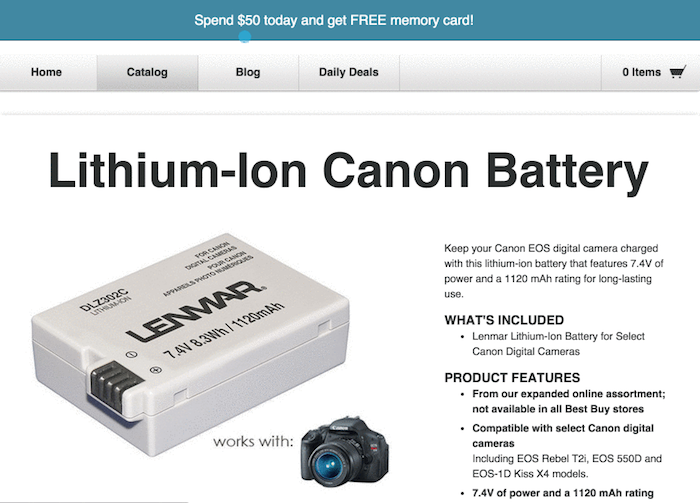
Developed by BOLD, this app allows retailers to set purchasing thresholds and then offer shopper rewards when they cross them. For instance, get a free gift when you reach $100 in your cart. Or receive free shipping with orders over $150–whatever the goal may be. Store owners can customize their goals and rewards. As described by the developers, they created this app because it builds on a proven sales technique: when customers have an incentive to buy more, 3 out of 10 times they will take the seller up on the offer.
Privy: Free to $199/month plans
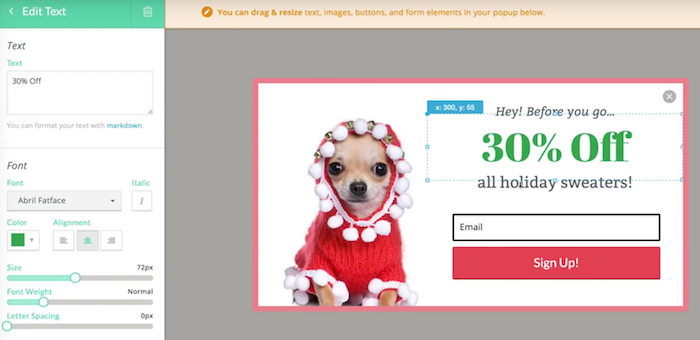
Privy is an app that encourages onsite sales in another way. With it, retailers create pop-ups to present offers to shoppers in exchange for their email addresses. Store owners can customize the offers to appear when and how they want. For instance, a merchant can set an offer code to appear after a shopper has browsed the site for 20 seconds. The shopper gives his email address in order to receive the code. Now the merchant has the shopper’s email for future mailings, and the shopper has a discount code to incentivize him to make a purchase.
Apps for Re-Engaging Customers After They Go
Abandonment Protector Plus: Starting at $8/month

With Abandonment Protector Plus, retailers set up a series of emails for customers who have left their online store without a purchase. The email template is easy to build and offers lots of options for customization. In the example above, three emails are scheduled to go out: the first one 12 minutes after the customer has left the store, then 5 hours after the first email, and finally, 18 hours after the second email. So, within 24 hours, potential customers get notified three times about their recent visit. These notifications can serve as reminders or offer discounts on an abandoned product. Within the app’s 164 5-star reviews, store owners say their rates of order recovery range between 20-26%.
Loyalty Lion: Free to Monthly Plans ($159-$699)
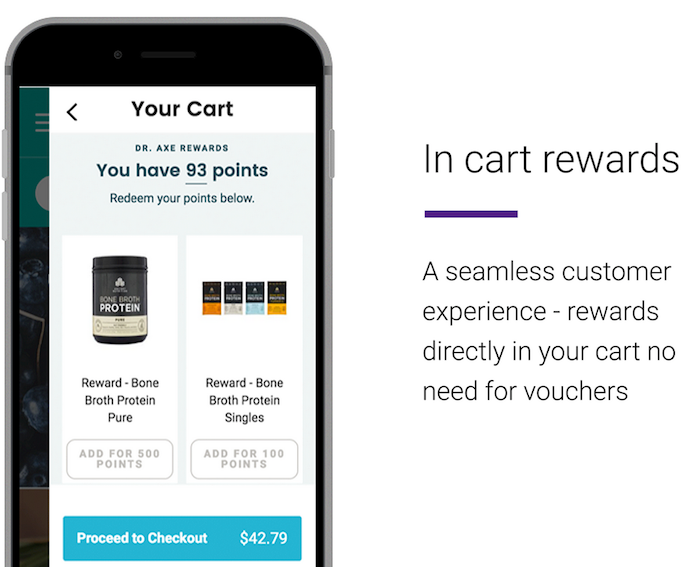
Loyalty Lion helps retailers develop point-based loyalty programs. It’s flexible; store owners decide what activities they want to reward–signing up for email, social media likes, or making purchases, for instance. Customers earn points with each activity. As they accumulate points, store owners can offer five different types of rewards: dollar amount discounts, percentage discounts, free products, free shipping, and/or discounts off product categories. The app is optimized for mobile and integrates well with others, such as our aforementioned Yotpo. Loyalty Lion is a pioneer in online loyalty, and we had the good fortune of interviewing their CEO, Charlie Casey, last year. Here’s what he had to say.
Referral Candy: From $49/month

Referral Candy’s developers introduce their app like this: “Only 29% of your customers are telling their friends about you, even though 83% of them are willing to do so.” Interesting proposition, no? The reason that more customers don’t promote your store is because they lack incentive. Referral Candy aims to fix this.
There are three steps: 1) A customer makes a purchase. 2) Referral Candy sends the customer a unique coupon code to share with friends. 3) When a friend buys something, the customer gets a reward determined by the retailer. The app has templates to send out codes via email and/or social media. The image above shows a Referral Candy prompt to post a code Twitter and Facebook friends.
MailChimp: Custom pricing
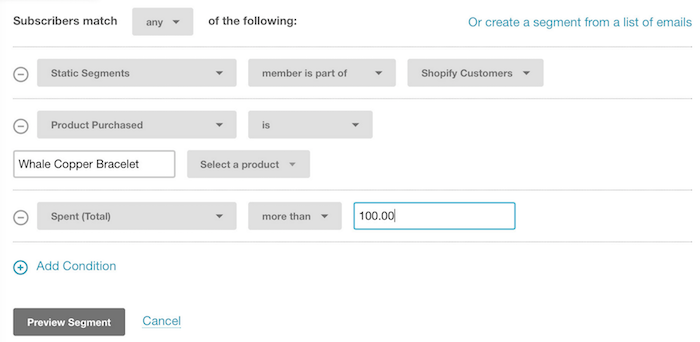
A perennial favorite, MailChimp keeps getting better. They’ve grown up with ecommerce and continue to offer new features to grow online retail. One of our favorite tools is the ability to segment an email list based on customer purchases.
Let’s say you have a group of customers that all bought a specific DSLR camera last quarter. Now as the brand offers new accessories for the camera, you can send an email to recent buyers promoting the accessories for sale in your store. MailChimp also has advanced segment options that allow retailers to build a campaign for a geographic area or another characteristic. The possibilities are open and exciting. We believe MailChimp will stay on the list of best Shopify apps for a long time to come.
As we reviewed these apps, a phrase came to mind: We’re all in this together. Indeed we are. Shopify, as a platform, keeps improving. The community of app developers that service Shopify stores continues to grow and create solutions. And best yet, our clients–ecommerce store owners–sell more and stress less as they take advantage of new technologies.
